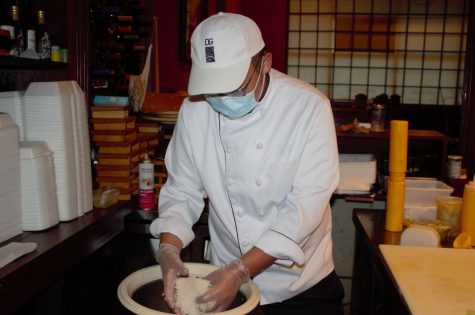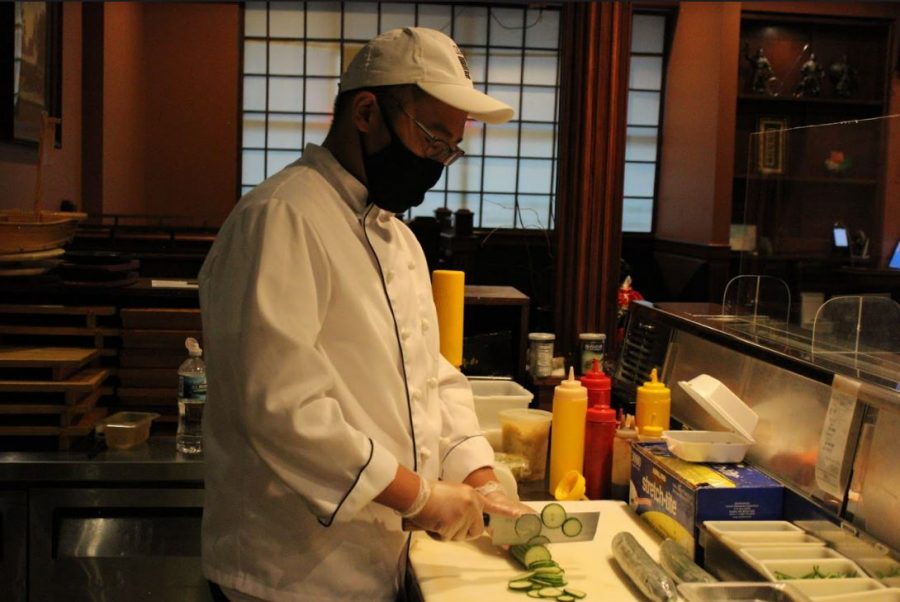Senior Kevin Dagvadorj works in the kitchen of his family restaurant making another sushi roll for carryout. Dagvadorj’s family owns Tegry Bistro and he has worked as a waiter there in the past.
However, according to Dagvadorj, as a result of changes made with the COVID-19 pandemic, he is now a sushi chef.
Dagvadorj said, “I used to work as a waiter at the Traders Point location, but because of the pandemic we were understaffed at Fishers and so I became a sushi chef there.”
Dagvadorj’s change in employment isn’t an isolated event of local small businesses having to adapt to the challenges that face them amidst the pandemic.
According to Adam Aasen, co-owner of Donatello’s Italian Restaurant, local restaurants face many difficulties as business has reduced dramatically in the past year.
“We were seeing our business decrease a little bit even before the governor announced the shutdown of restaurants (in May) because people were kind of afraid to go out to eat. They were afraid to leave their house,” Aasen said. “(Now) we’re starting to see as the numbers rise again, people are a little more hesitant to go out.”
This trend of people being afraid to dine in restaurants is approaching its one-year anniversary. With March 24 dubbed as “The Great American Takeout,” at this time last year, restaurants have been encouraging customers who are afraid to dine in to support businesses and purchase carryout throughout the pandemic.
According to Avery McQuillan, senior whose family owns the Carmel (West Clay) location of Greek’s Pizzeria, there has been an increase in carryout orders as the number of people dining in restaurants decreases.
“(COVID-19) has actually weirdly benefited us in a way,” McQuillan said. “Although we are doing little to no dine-in eating, we are doing really well with carryout and delivery (orders) since our customers are so loyal (and) they are keeping us busy during all of this.”
To encourage customers to support them during ever-changing times and stay safe, these small businesses adapted their procedures. Dagvadorj said his family’s business has made changes to follow COVID-19 regulations by requiring social distancing and cleaning their restaurant more often.
According to Dagvadorj, “We now have stronger cleaning products and much more thorough cleaning practices for anything that customers may touch and social distancing procedures which (include) limited seating.”

Additionally, McQuillan said her family operates with similar procedures to be more sanitary and ensure the safety of customers.
“We are wearing masks 100% of the time and we all (have) gloves on to limit our contact with people,” McQuillan said. “We make sure to take employees’ temperature so we can make sure we are all good to go and healthy.”
Kevin and Richelle Rider, co-owners of Woody’s Library Restaurant, said they have also made changes to their restaurant’s seating so more customers feel comfortable dining outside throughout the entire year.
Mr. Rider said, “I’m always looking for a way to make the customer experience better. I just got done doing that out on our patio. We made it more winter-friendly because people want to (dine) outside (during the pandemic).”
According to Aasen, changes in procedure have been quick due to the flexibility of small businesses, which has been proven to be advantageous amidst COVID-19.
“Small businesses are more nimble. When things go wrong, they’re able to shift and change much faster. They don’t have to run it up to corporate,” Aasen said.
Mrs. Rider agreed that small businesses are able to make changes much quicker than larger chain businesses, largely due to the fact that they already make many decisions on a daily basis.
“I think in our business, we deal with huge challenges everyday, (so) we’re just used to shifting gears all the time,” Mrs. Rider said. “(This) is just kind of a different way of shifting gears.”
According to McQuillan, another factor contributing to the capability of small businesses during difficult times is their consistent customer base.
McQuillan said, “(By) owning a small business (instead of) a chain (restaurant), people know that what we are selling is going to be (good) quality and fresh so we have a very set customer base.”
Similarly, Dagvadorj accredited this ability to adapt quickly to the loyalty of customers, stating that as a small business, his family’s connection with customers has been evident during unprecedented times.
Dagvadorj said, “We have complete control over how we manage ourselves. It gives us a stronger connection to our customers and since we are local, we are able to support other local businesses by buying from and supporting them as well.”




























![Keep the New Gloves: Fighter Safety Is Non-Negotiable [opinion]](https://hilite.org/wp-content/uploads/2024/12/ufcglovescolumncover-1200x471.png)
















































![Review: “We Live in Time” leaves you wanting more [MUSE]](https://hilite.org/wp-content/uploads/2024/12/IMG_6358.jpg)
![Review: The premise of "Culinary Class Wars" is refreshingly unique and deserving of more attention [MUSE]](https://hilite.org/wp-content/uploads/2024/12/MUSE-class-wars-cover-2.png)
![Introducing: "The Muses Who Stole Christmas," a collection of reviews for you to follow through winter [MUSE]](https://hilite.org/wp-content/uploads/2024/12/winter-muse-4.gif)
![Review: "Meet Me Next Christmas" is a cheesy and predictable watch, but it was worth every minute [MUSE]](https://hilite.org/wp-content/uploads/2024/11/AAAAQVfRG2gwEuLhXTGm3856HuX2MTNs31Ok7fGgIVCoZbyeugVs1F4DZs-DgP0XadTDrnXHlbQo4DerjRXand9H1JKPM06cENmLl2RsINud2DMqIHzpXFS2n4zOkL3dr5m5i0nIVb3Cu3ataT_W2zGeDAJNd_E-1200x884.jpg)
![Review: "Gilmore Girls", the perfect fall show [MUSE]](https://hilite.org/wp-content/uploads/2024/11/gilmore-girls.png)
![Review in Print: Maripaz Villar brings a delightfully unique style to the world of WEBTOON [MUSE]](https://hilite.org/wp-content/uploads/2023/12/maripazcover-1200x960.jpg)
![Review: “The Sword of Kaigen” is a masterpiece [MUSE]](https://hilite.org/wp-content/uploads/2023/11/Screenshot-2023-11-26-201051.png)
![Review: Gateron Oil Kings, great linear switches, okay price [MUSE]](https://hilite.org/wp-content/uploads/2023/11/Screenshot-2023-11-26-200553.png)
![Review: “A Haunting in Venice” is a significant improvement from other Agatha Christie adaptations [MUSE]](https://hilite.org/wp-content/uploads/2023/11/e7ee2938a6d422669771bce6d8088521.jpg)
![Review: A Thanksgiving story from elementary school, still just as interesting [MUSE]](https://hilite.org/wp-content/uploads/2023/11/Screenshot-2023-11-26-195514-987x1200.png)
![Review: "When I Fly Towards You", cute, uplifting youth drama [MUSE]](https://hilite.org/wp-content/uploads/2023/09/When-I-Fly-Towards-You-Chinese-drama.png)
![Postcards from Muse: Hawaii Travel Diary [MUSE]](https://hilite.org/wp-content/uploads/2023/09/My-project-1-1200x1200.jpg)
![Review: "Ladybug & Cat Noir: The Movie," departure from original show [MUSE]](https://hilite.org/wp-content/uploads/2023/09/Ladybug__Cat_Noir_-_The_Movie_poster.jpg)
![Review in Print: "Hidden Love" is the cute, uplifting drama everyone needs [MUSE]](https://hilite.org/wp-content/uploads/2023/09/hiddenlovecover-e1693597208225-1030x1200.png)
![Review in Print: "Heartstopper" is the heartwarming queer romance we all need [MUSE]](https://hilite.org/wp-content/uploads/2023/08/museheartstoppercover-1200x654.png)




